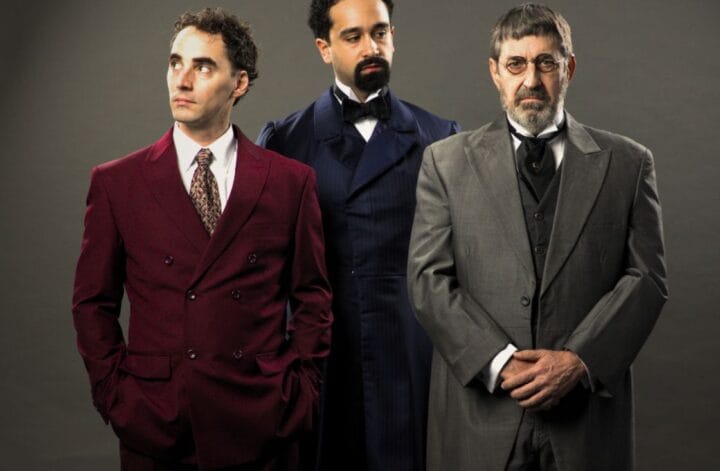For… reasons that are definitely reasons, our eternal and often futile struggle to create and maintain human connection is a bit of a preoccupation of mine. Maybe that’s why I felt so affected by Everything Is Super Great, the new play by Stephen Brown that appeared in its co-world premiere at Theatre Lab last weekend and is playing until December 22. (In a co-world premiere, more than one company produces a play at about the same time so they can share world premiere credits.)
Thanks to a witty script that offers a consistent stream of laughs, the show’s two and a half hours seemed to go by in a flash; in hindsight, I wonder if such repartee masked gaps in character development, but at the time I was too busy enjoying it all. Stand-out scenes include a slapstick balloon-popping sequence, a workplace smoke break, and an incredibly awkward Christmas party.
The show is subtitled (a comedy about what’s missing), but the show certainly had its dramatic side as well. Perhaps it could more accurately be described as about who’s missing; most notably, the main character Tommy’s brother, whose absence shapes the plot and his psyche, but also some loved ones of supporting characters Dave (Tommy’s therapist) and Alice (his manager at Starbucks, also kind of his crush).
Timothy Mark Davis is believably bumbling and consistently hilarious as Dave, who, it turns out has no suitable qualifications for therapizing. Christian Mouisset, as Tommy, delivered an overall excellent performance, but occasionally slipped into a somewhat whiny register, especially when delivering questions or dealing with his perennially annoying mother, Jeni Hacker’s Anne, though I could also certainly sympathize with his characters’ dismissive reaction to her overeager mothering.
Anne works at Walmart, her idea of a homemade baked good/appropriate Christmas gift is a buttered and toasted pop tart, and an amateurish collage seems to her an appropriate way of commemorating her missing child. Hacker played the role unironically and sincerely, which was especially impressive given these somewhat lowbrow attributes and led to both some of the play’s funniest moments and the most touching ones, which showcased her ardent love for her son.
In the end, though Dave and Alice’s missing person subplots both find some resolution, there are no real answers to be had regarding Tommy’s brother; instead, he and his mother must begin to cope with the fact that answers probably will never be had.
Meanwhile, though Alice and Tommy bond throughout the show, it never becomes overly romantic, and by the play’s end, the winds of chance that brought them together seem to have brought them apart again; a bittersweet final monologue by Tommy suggests that this separation will most likely be permanent. It isn’t any less special because it was not a “relationship” that it was so short-lived, or in that it most likely will never be rekindled, sustained. Sometimes moments are all we get. It was there. It happened. It matters.

